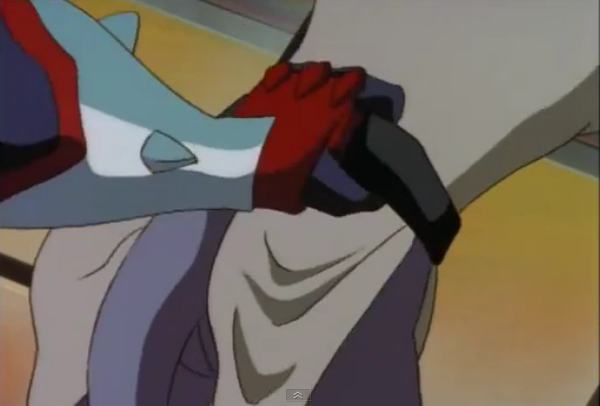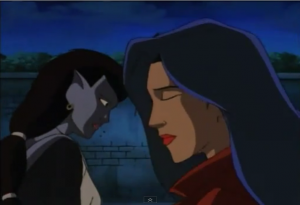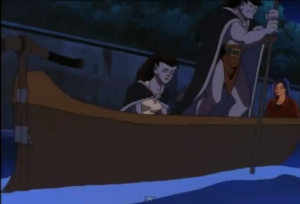Now we’re taking.
The “World Tour” has finally started to live up to its promise, with two solid episodes that finally gives Avalon’s mission some purpose. Both episodes bring subtext to the forefront as well, something that Gargoyles always had a bit of a problem with. The episodes themselves are strong, narrative-wise, but the subtext is where the real meat is. And while “M.I.A.” takes the theme of drive and purpose, and turns it against itself into obsession, “Sanctuary” is noteworthy because so far, out of the entire show, this arguably may be the first episode to deal with its patriarchy/ feminist subtext so overtly – how drive and purpose is also used as manipulation and control, in particular of male control over women, and the various ways its subverted.
Gargoyles 2×28 – Sanctuary
Vezi mai multe video din animatie
The crew arrives in Paris, and Elisa decides to do some sightseeing while the gargoyles are stone. She witnesses Macbeth and human Demona being lovey-dovey and tries to tail the latter after they separate, but she loses her. Elisa returns to Goliath with the information as well the news that some winged creatures were spotted over Notre Dame. Goliath and Bronx goes there to investigate, but before all of this, we need to talk about Goliath’s behavior towards the two women in his life, because for the first time, it’s a lot more harsher and controlling, cleverly paralleling Thailog’s actions later in the episode.
I had mentioned how disappointed I was with the father-reveal from “Monsters,” and while I still have some issues with that, “Sanctuary” does deal with the fallout, in unexpected ways. Angela addresses Goliath as “father,” a name he shoots down immediately, demanding that she think of the entire clan as her patronage. There is a truth to this, of course, but it’s a passing-the-buck kind of truth – as of this moment, there IS no clan. There is a thin layer of resentment Goliath shows Angela here, and I can imagine that after “Monsters,” Angela has tried to talk to Goliath about their relationship, which only made him think of the pain in losing Demona. It’s obvious that he wants to put a wall between that kind of bond, and he’s hiding behind gargoyle tradition to make it so.
It gets worse when he learns of Demona. Goliath attempts to solidify the wall, and he does two surprisingly terrible things: first, in order to keep Elisa with Angela, he tells Elisa that he wants to keep his daughter away from her mother (due to Angela’s concern about her parentage); then in the same beat, pushes the truth AGAIN by claiming Demona’s desire for vengeance is so strong that he needs Angela to stay with Elisa, to protect her. It’s a shock to see the noble Goliath pull such manipulations to keep them passive, shooting down any protestations, and it’s even more devastating that the two women acquiesce, portrayed in a two-shot of Elisa and Angela facing each other but not quite on the same plane, looking down and not at each other.
Goliath confronts Demona, and after a really poorly shot action scene (I get the sense that the editors here were cutting around particularly ugly visuals), Thailog arrives, and he and Demona are now a couple. It’s a bit tough to watch Demona, who was driven by hate (but a hate that she owned up to), kind of submit to Thailog over love, but there’s so many layers of control and manipulation here that it’s almost a miracle that the episode get away with it. Goliath thinks Demona is manipulating Thailog, both to get the false-Goliath to turn against humans as well as some other sinister plan involving Macbeth. After failing to convince him, and being accused of being jealous (and there’s definitely a layer of jealousy here), Goliath flies off, back towards the women he CAN control. Despite the ugly animation, the shot of Goliath standing tall in between the seated, submissive Elisa and Angela in the boat speaks uncomfortable volumes.
Here’s the full extent of the story: Goliath thinks Demona and Macbeth are plotting against Thailog. But Demona is actually marrying Macbeth only to imprison him for all eternity, declare him legally dead, and inherit his fortune, so as to combine it with Thailog’s cashflow stolen in “Double Jeopardy.” (The episode glosses over exactly what happened to them after “Avalon.” The Weird Sisters’ spell seems to “couple” the two as a unit – as a team in “High Noon” and here as lovers, but in both cases it’s temporary, and I guess Demona turning into a human during the day snapped her out of the spell quicker than Macbeth, which allowed her to manipulate him. It’s kinda messy and unclear, in particular how Macbeth is rich in Paris, but the plot cooks so it’s more fun to follow along.) The biggest reveal is Thailog is manipulating them both! He’s finagles a way to position Macbeth and Demona to try and kill each other so he can win BOTH their fortunes. Nice to see the guy utilizing his Xanatos’ training, and nice for the episode to toss aside the whole weird “male/family/shipping” vibe from “Double Jeopardy.”
I think it was all tossed aside to emphasize the more legitimate and creepy daughter/father vibe (and, by proxy, that sense of patriarchal/sexual control). In particular, when Goliath and Angela go up against Thailog, the latter speaks of Angela with a very libido-driven tone: his line-reading of “Mmmm, and a young one at that” isn’t lost to the viewer. Of course the show can’t get too explicit – or even too implicit – but the connotation can’t be denied, especially with the episode’s whole approach to control. Take a look at the opening screenshot – Thailog’s grabbing of Angela in that shot is charged as all hell. The whole episode is about powerful male figures taking control of female ones, and their attempts to fight back against this. It’s all there, especially in the fight between Demona and Macbeth; Macbeth is trying to kill Demona, while Demona is trying to control him. It’s powerful, intriguing stuff.
Elisa ends that fight by shooting Demona, knowing that no one else can kill the two except by each other’s hand (I forget if she learned that in “City of Stone” or “Avalon.”). Macbeth awakens miserable but somewhat comforted knowing that he is capable of love, despite this date ending somewhat awkwardly. Demona awakens and sees Angela for the first time, and there’s a connection there, although Demona runs off with Thailog before she can recognize it. It’s still odd to see Demona flail back into Thailog’s arms, but it’s less weakening the character and more for her to plot with a new Xanatos-equal. Less intriguing is the obvious “more than just friends” relationship burgeoning between Elisa and Goliath, especially with all the early shutting down of Elisa’s thoughts he did. I do like that Elisa smartly ended the Demona/Macbeth fight, and straight-up told Angela that Demona was indeed her mother. I hope this will allow the both of them to push back against Goliath a bit more, especially as it’s clear the show is gearing them to be a more familial unit, but it’s important to make sure Elisa and Angela still can stand on their own and are willing to call the main gargoyle out for his bullshit. It’s awkward in spots (the attempts at making “sanctuary” a running theme in the episode doesn’t work at all), but the gender/control subtext of the episode, coupled with the show’s theme of drive and reasons to keep going, makes it a standout.
“M.I.A.” [apologies, the episode isn’t set to allow embedding] is another highlight, but less in subtext, and more in setting up a tight narrative and creating memorable characters in a short amount of time. This episode also takes the theme of what drives people, and turns it against itself, and how that can be perverted in a way that has nothing to do with obsession, greed, or power. For this episode, it’s vengeance, but not the almost-justified, all-encompassing kind like Demona, but the petty, misguided, heat-of-the-moment kind that masks grief, guilt, and shame.
The top-tier studios are brought in for a beautiful take on three of the hatchlings of Goliath’s old brood (I think – I had to wiki this, but I didn’t want to look too much as to avoid spoilers) that has taken up in London. I should say two, though, as Una and Leo, who are more animal-anthropomorphic than typical gargoyles (which is a bit confusing), refuse to help local Londoners being harassed by nearby thugs. It should be noted that this runs counter to the whole gargoyle mantra – their whole purpose is to protect. Without that, they become rude, cruel, and vindictive, especially when Goliath and his friends have the “audacity” to ride into town.
To what extent should your purpose in life take you? If your purpose is to protect, is that just the home? The town? The state? The world? That’s the question “M.I.A.” poses, with Una, Leo, and the late-Griff as our debaters. Before getting to that, there needs to be some setup. The crew sees a commemorative statue to Griff and Goliath and are rightly confused, but a local friendly British guy tells the story of some creatures helping the Brits turn the German blitzkrieg. He takes them (well, Elisa, as Goliath, Angela, and Bronx follow) to Una and Leo, who are pissed at Goliath for what seems to be inexplicable reasons. Una knocks them all out with a spell, and when Goliath awakens, he finds his friends missing. Una and Leo sadistically hid them away, claiming to return the pain Goliath himself caused when he failed in his promise to protect Griff.
That is a hell of a thing. Una and Leo’s actions are vicious, Una clearly the mastermind here due to the obvious crush she had on Griff. Beyond that, though: this is what happens when the need to be given a purpose is suddenly drawn out after being packed in for so many years, creating this ill-advised, sad attempt at revenge. Even though their actions are abhorrent, you can’t help but feel sympathy for them, so desperate they are at wanting to something, anything, for they’re fallen comrade and the guilt they feel for what their part it in may be. As of right now, though, it’s just vindictive anger, and this forces Goliath to use the Phoenix Gate to figure out what the hell is going on.
He warps back into 1940s Britain, and after a narrow brush with a plane, runs into Griff. He introduces them to past-Una and Leo, and thus begins the discussion of their goal. Griff is gung-ho about stopping the Nazis, but Una and Leo are more reluctant. They claim this isn’t their fight, and it’s true, to an extent. But Griff truly believes in this fight and Goliath, while attempting to stay out of the debate, knows the consequences of staying out of battles with stakes bigger than the personal. As Goliath says: “In my experience, human problems become gargoyles problems.” He helps Griff, with the promise to protect him. Hence, the beginning of the episode.
Breath-taking action scenes follow as the two gargoyles battle the Germans and their non-Nazi-symboled aircraft. I particularly love the unspoken team-up that develops between the gargoyles and the British pilots. It’s a great moment, emphasizing how the higher stakes force everyone to look past differences and stand up to an ultimate evil. Goliath saves Griff’s life as promised, but it looks as if fate will not be denied. It attempts to create other methods to kill Griff, Final-Destination-style. Goliath breaks it by warping the two of them back to the present. I’m not sure how logical it sounds – wouldn’t fate try to kill him in the present? – but, you know, magic. Also good episodes allow you to ignore logic and enjoy everything that happens.
It also makes for a wonderful reunion in the end, too, as Leo and Una finally comes to terms with the part they played in Griff’s death. Sure, they didn’t do anything, but “evil prevails when good men do nothing,” and all that. To a gargoyle, doing nothing is the same thing as being evil, and the consequence of that was losing Griff, Goliath or no Goliath. Leo realizes this first, and Una follows suit, pushing past her emotional connection to Griff and embracing her guilt and grief simultaneously. In a way, the episode “rewards” this powerful moment with Griff’s return; the real reward is watching the three finally fight off the thugs from early in the episode.
The time-travel plot is handled simply and strongly here, a bit less cluttered than “Vows” or “Avalon.” There’s even a bit of a joke about the complexity of time travel with the final Goliath/Elisa exchange in the end, probably a bit of an in-joke about their past time-travel episodes. Regardless, “Sanctuary” and “M.I.A.” finally gives the World Tour episodes their own drive, their own real purpose. Here’s hoping they can keep this up.
“Sanctuary” A-/”M.I.A.” A-



Comments are closed